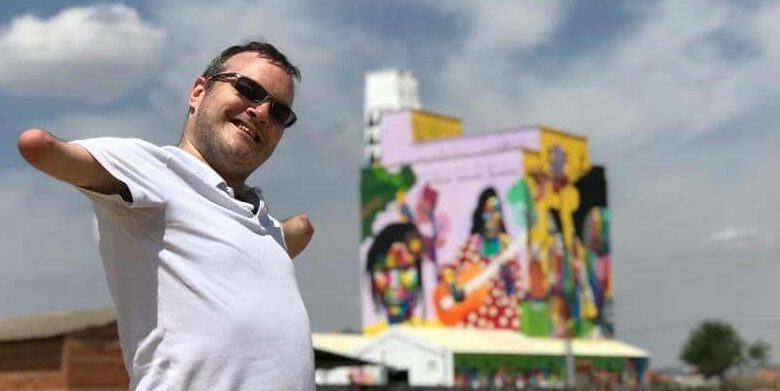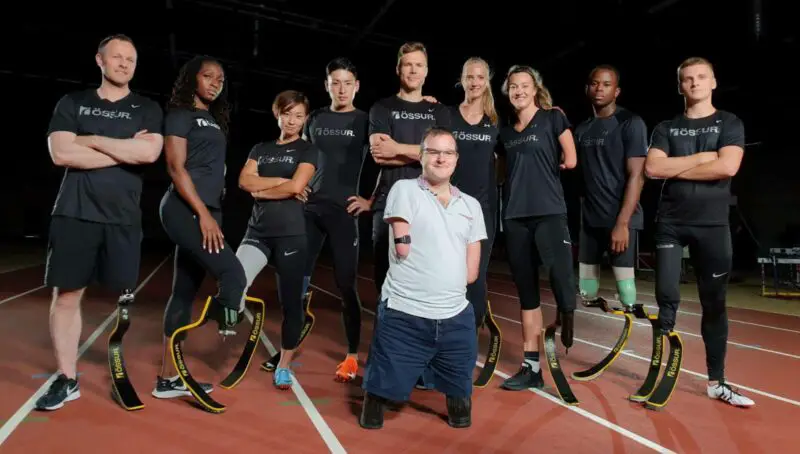
Paul Carter: journalist and senior producer with a disability for the BBC
Paul Carter is a senior producer and technology reporter for the BBC. He was born without lower arms or legs. He has dreamt of becoming a journalist all his life and has gone on to appear on and produce BBC Newsnight, BBC Radio 5 Live, BBC Travel Show and is a regular member of the team at BBC Click. Our writer, Emma Purcell, got the chance to interview Paul to find out more about his life with a disability and his successful media career.
Paul began his career as a staff writer for Zoo magazine, then landed himself a role as a reporter at Disability Now.
In 2010, Paul made a career switch, moving into television production. He joined Markthree Media and went on to produce coverage of the 2012 Paralympic Games and BBC Newsnight.
In 2015, Paul returned to journalism and became a broadcast journalist for BBC Radio 5 Live on the breakfast show.
He is now a technology reporter for the programme BBC Click, and also occasionally features on the BBC Travel Show.
Paul Carter’s disability
What was it like growing up with your disability?
I was very fortunate to have been brought up in a family that treated me no differently than my non-disabled brothers. My parents made a conscious decision to send me to mainstream school so that I could have the same childhood as any other non-disabled kid my age.
That obviously had its pros and cons along the way. But I’m extremely grateful to my parents for it – I have no doubt that it has shaped who I am, and continues to do so to this day.
How does your disability affect you on a daily basis?
Obviously, on a wider societal level, I’m faced with the same barriers as other disabled people. On a personal, day-to-day level, the main thing that impacts me is my height! I only use short prosthetics, so on a good day (ha) I’m four foot something.
However, generally, my routine is well established so I don’t have too many issues – touch wood.
Have you ever considered prosthetic forearms?
I had every variation of prosthetic arm imaginable as a kid! I had hooks, electric hands, sticks, cutlery – the works. I was basically a living dressing-up box.
I realised quite early on though that none of them were for me. Obviously, different people have different experiences and make their own choices.
For me, I found that they completely removed any sense of touch or tactility, and ended up hindering what I wanted to do rather than helping.

Do you use assistive technology to access your phone, tablet or computer?
Not generally. I use the new voice control in iOS13 and similar in Windows 10, but that’s a luxury rather than a necessity. If I’m being honest, it’s laziness more than anything else!
Do you have adaptations or support in your home to carry out daily tasks, such as cooking, cleaning and laundry?
I’m actually extremely low maintenance! I have a couple of boxes/step stools to help me reach stuff (being the aforementioned short-arse), but that’s about it.
Paul Carter becoming a journalist
Why did you decide to become a journalist?
I have wanted to be a journalist all my life. Well, at least once I realised that my dreams of becoming a football manager were never going to materialise!
Academically, I went down a different path at university. But, after uni, I decided that it was what I wanted to do, so went back to college to study journalism (NCTJ).
How did you get your first job as a staff writer at Zoo magazine?
I did a couple of weeks of work experience there before doing my NCTJ, which turned into a couple of more weeks. Then, as part of my training, I had to do another work placement, so I was lucky enough to be able to go back. They never managed to get rid of me after that!
When you were a reporter for Disability Now, what was your favourite story to write?
To be honest, we did so much terrific stuff that I can’t single out any one thing. I’m so proud of some of the journalism we did at that time, shining a light on issues, people and stories that nobody else would have touched. It’s very much missed.
How did you become a broadcast journalist for BBC Radio 5 Live and what did you enjoy most?
The boring answer is that I applied for it and got it! I was actually working on Newsnight at the time and had learnt an awful lot there. But my contract was coming to an end and the opportunity at 5 Live came up. It meant moving to Salford and moving from TV into radio, but I’m glad I did it.
The brilliant thing about 5 Live is that it’s a great barometer of public opinion. It’s hugely in touch with its listeners and what they’re talking about. In a single programme you could cover serious issues one minute, and then something light the next.
You recently appeared in an episode of the BBC Travel Show, investigating accessibility in Tokyo ahead of the 2020 Paralympic Games. What was that experience like?
It was a brilliant experience. I learnt so much about Japan, and I’m not afraid to admit that I had some of my preconceptions about what I was going to experience challenged.
Disability and inclusion is an area where there is still a lot of work to be done in Japan, but I got the sense that there’s a desire to make changes and things are moving in the right direction.
Paul Carter as a producer
What was it like being a producer for BBC Newsnight?
Newsnight was a great experience, working with some really talented, lovely people. It was extremely hard work, and you had to be able to turn your hand to anything, from Chinese economics one minute to the presidential race in Ukraine the next. That certainly was a challenge! But I loved it.
How did you go on to produce coverage of the 2012 London Paralympics for Channel 4 and what were your highlights working there?
When working at Disability Now I’d been fortunate enough to cover quite a bit of Para-sport events, which basically put me in a good position to cover 2012 stuff.
It was an absolute blast, though also completely exhausting! I was based in the Broadcast Centre on the Olympic Park, which was a once-in-a-lifetime experience, really.
I have so many highlights. But if I had to pick one it would probably be being behind the camera in the ‘audience’ of the first-ever recording of The Last Leg.
Paul Carter as technology reporter on BBC Click

How and when did you become a member of the BBC Click team?
I first got involved with BBC Click when the BBC was producing an episode to tie in with the daftly-named International Day of Persons With Disabilities back in 2017.
I was asked to pitch some ideas and ended up lead-producing the show. Again, bar a couple of small gaps, they haven’t managed to get rid of me!
How did you become interested in technology?
I’ve been fascinated by technology all my life, so working on Click was always, and continues to be, my dream gig. I’m especially interested in how technology influences and shapes the world and at Click. Those are exactly the kind of stories we do.
What has been your favourite story to report on BBC Click so far?
I’m a bit of a transport geek, so filming a firefighting train in Geneva last year has to be right up there! As part of that same episode, I also got to experience being in a burning building wearing full breathing apparatus. It was an experience I never thought I’d have.
There are also so many other things too: being in an operating theatre while a patient had a tumour removed via robotic hands; seeing drones take off from an air force base in Denmark; being harassed by sheep in the Faroe Islands – too many to mention!
Have you reported on many disability-related technology stories on BBC Click?
Absolutely. We do an episode each year to tie-in with the International Day of Persons With Disabilities. But we’re very keen not to just silo disability stories into one episode. We can and do feature them throughout the year.
Recently, I’ve looked at technologies to help blind children learn to code, sign language interpretation algorithms, accessible fashion etc. The programme has also done stories on exoskeletons, glasses for visually impaired people and countless others. If the tech is sufficiently new and interesting, we’ll cover it.
What stories have you got coming up on BBC Click?
We’ll be doing another disability-themed show for International Day of Persons With Disabilities this December. I’m also going to Iceland to look at the next generation of technology being designed for Paralympians.
Aside from that it’s a total mixed bag and depends what comes up. That’s partly what makes the job so much fun!
What advice would you give to other disabled people seeking a career in broadcast journalism or television production?
Try and get as much experience as you can. That doesn’t have to be work experience or internships, it can be blogging or vlogging etc.
If you want to be on screen and don’t have a YouTube channel. for example. then that might hold you back.
Also, most of the major UK broadcasters now run schemes and initiatives to recruit more diverse/disabled people into the industry – absolutely make use of those.
Otherwise, just keep at it. Have a passion for what you do. If you have a specialism or specialist knowledge then use that to your advantage, Lastly, above all else, be the person you’d want someone to employ.
You can follow Paul Carter on Twitter @paulcarterTV.
By Emma Purcell
Check out more of Emma’s work by visiting her blog Rock For Disability.
More on Disability Horizons…